by Gary Lord
Home - Genesis - 2007 - 2008 - 2009 - Early 2010 - Mid 2010 - Late 2010 - End 2010 - Early 2011 - Mid 2011 - Late 2011 - End 2011 - Early 2012 - Late 2012 - Early 2013- Late 2013 - 2014 - 2015 - Early 2016 - Late 2016 - 2017-19
Chapter Thirteen: Early 2012
In January 2012, Rolling Stone magazine published a lengthy and revealing interview with Julian Assange. Author Michael Hastings - whose book about the Afghan War, The Operators, lead to the resignation of "rock star" US General Stanley McChrystal - spent three days with Assange at Ellingham Hall. He compared the 40-year-old WikiLeaks founder to an "embattled rebel commander" whose protracted legal battles had left him "isolated, broke and vulnerable".
Assange recently spoke to someone he calls a Western “intelligence source,” and he asked the official about his fate. Will he ever be a free man again, allowed to return to his native Australia, to come and go as he pleases?
“He told me I was fucked,” Assange says.
Assange explained how WikiLeaks had come to focus on Western states:
Initially we thought that our greatest role would be in China and some former Soviet states and in Africa. We did have early successes in Africa. I lived in Kenya in 2007, and we were able to source a document that exposed billions of dollars of corruption by the former president Daniel arap Moi and his cronies. The evidence ended up swinging the vote by 10 percent and changing the Kenyan election. But Moi’s corruption didn’t exist in Kenya alone. The money looted from Kenya was deposited into London banks, properties and businesses, into New York properties. There is no large-scale corruption in the developing world without Western corruption. That was an important lesson to me.
Another important lesson was that, very quickly, we started receiving information from what we presumed to be disaffected U.S. government employees about the actions of the U.S. military. The United States has historically been a relatively open society. But within the United States, there is a shadow state, and that is the U.S. military, which, as of September, held 4.3 million security clearances. That is equal to the population of New Zealand. That is a closed, totalitarian society that gathers and stores more information than any other society in the world.
When Hastings suggested that Assange was waging "a lifelong campaign against authority", he took exception.
Legitimate authority is important. All human systems require authority, but authority must be granted as a result of the informed consent of the governed. Presently, the consent, if there is any, is not informed, and therefore it’s not legitimate. To communicate knowledge, we must protect people’s privacy – and so I have been, for 20 years, developing systems and policy and ideals to protect people’s rights to communicate privately without government interference, without government surveillance. The right to communicate without government surveillance is important, because surveillance is another form of censorship. When people are frightened that what they are saying may be overheard by a power that has the ability to lock people up, then they adjust what they’re saying. They start to self-censor.
He also rebuked the suggestion that he had "a massive ego".
I don’t think I have a massive ego. I just am firm at saying no. No, we will not destroy everything we’ve already published. No, we will continue to publish what we have promised to publish. No, we will not stop dealing with U.S. military leaks. For some people, that comes across as a big ego, when it’s just sticking to your ideals.
Assange said his confrontation with the Western national-security state – "it’s not quite right to call it the U.S. national-security state, because it’s a transnational phenomenon" – had brought out the best and worst in people.
In November, I told our people, perhaps to their surprise, that what we were doing was more significant than the life of any one of us. To that degree, the battles that we’ve had, the severity of the battles that we’ve had, is not something I have found to be difficult to deal with. Their severity is a reflection of the quality and importance of our work. That said, the betrayals are hard to take…
Assange said that many people who had "an involvement to some extent in our work" then overstated their contribution "to gain authority". Then, when WikiLeaks was not able or willing to continue the relationship, "they feel rejected".
What they lose through the lack of an ongoing relationship seems to be so incredibly valuable to them, so their desire to keep it, or their feeling of loss when they are not able to preserve the interaction, is so extreme that it drives them to do things you would not normally expect people to do.
Assange said his children had received death threats and numerous stalkers had turned up at the front door of his rural retreat - "three hours out of London by fast train, plus another 40 minutes in a car through country roads, and then through a long private driveway into the country house" - including many "women who thought they were my fiancee" and a certain Captain Morgan, who sold his ship and came to help "the only organization on Earth worth working for."
I always thought that A-level celebrities and their complaints about the difficulties of being a celebrity were rather self-indulgent. I’ve subsequently changed my opinion. Brad Pitt doesn’t have a superpower at his back. He just has some crazed fans and paparazzi. But now, having had all three, I must say, I’m not terribly impressed with the experience.
Assange said he had received a list of US government priorities "from an intelligence source" on the same day the Swedish sex allegations against him appeared. It said the US would find mounting a legal case against him very difficult, so therefore "I should be very cautious about extralegal means" such as "the planting of drugs, child pornography or being otherwise embroiled in disgraceful conduct". He said he didn’t take the "politicized sex scandal" very seriously at first because "I thought that it would disappear immediately".
We hired someone in the U.K. to cope with the volume of media inquiries. He accepted at a very substantially reduced rate because we’re activists, a cause célèbre. His largest clients were Virgin and Sony. After one week, it was clear that it was either us or them. His board, according to him, insisted that we be dropped, so we were. There have been about a dozen similar instances of pressure being applied to companies who we’ve been working with. When people say, “Why didn’t Julian do this, why didn’t Julian do that, why didn’t WikiLeaks do this,” in many cases we have actually tried. It’s not so easy when you’re fighting a superpower.
Assange said he was now "completely bankrupt" as a result of the Swedish extradition case, which he had so far had to finance himself.
I don’t think that is right. Actually, I think the organization should pay for it. It is unquestionable that the case has been politicized as a result of my role in the organization.
Assange said he wanted to go back to doing his work and traveling the world but had no idea whether WikiLeaks would even survive:
This week, I think we’ll make it. We’ll see what happens next week.
Friends & Foes

Assange’s many supporters around the world were doing what they could to help.
Australian Senator Scott Ludlam sent an email to Swedish Foreign Minister Carl Bild detailing prejudicial public statements made by Swedish officials and requesting their retraction "or at the very least cessation". Ludlam then accompanied WikiLeaks spokesman Jacob Applebaum back to Australia, where they both addressed a packed house at Melbourn’s Trades Hall. The "War On The Internet" panel included Julian Assange’s old friend Suellette Dreyfus and Crikey journalist Bernard Keane, plus a pre-recorded video message from Assange.
Ludlam later complained that his iPhone appeared to have been hacked by government officials, perhaps trying to obtain information on Appelbaum.
With help from supporters, Julian’s mother Christine Assange - who also suffered years of bizarre problems with her phone, Internet and email - set up a blog and posted a list of imaginative protest actions for Australia Day January 26.
Senator Ludlam and Christine Assange appeared together weeks later at another panel in Sydney, "Don’t Shoot the Messenger", chaired by popular TV news host Mary Kostakidis. They then continued to a Brisbane forum "The War on Wikileaks" in March.
In the USA, meanwhile, WikiLeaks’ lawyer Jennifer Robinson was attending a film on slavery at the Sundance Film Festival when she happened to bump into US Attorney General Eric Holder. She asked him about his intention to prosecute Julian Assange.
“How do you think history will reflect upon your treatment of WikiLeaks and Assange?”
Holder’s casual demeanour immediately changed when he realised Robinson was Assange’s lawyer.
“The release of confidential information is a very serious matter, and we have to draw the line somewhere,” he said.
Holder emphasized the damage the Cablegate leaks had caused to the USA and other countries, but refused to provide any details. Then he walked away. Robinson later noted that the US Attorney General who insisted on "drawing the line somewhere" had done nothing to prosecute CIA torture programs, instead jailing CIA whistle-blower John Kiriakou.
UK Supreme Court Appeal
On 2 February 2012 Julian Assange’s final appeal against extradition to Sweden was heard at the UK Supreme Court in London. A huge crowd of protestors, police and media observers gathered outside the court for the two day hearing.
Assange’s lawyers argued that the European Arrest Warrant system should be consistent across all countries involved, but in fact there were widely varying and inconsistent applications of law across the continent, and Sweden’s use of the system was especially questionable. In particular, Assange’s lawyers claimed that Swedish public prosecutor Marrianne Ny did not qualify as a legitimate "judicial authority" who could personally issue a European Arreest Warrant without any Swedish judicial or court involvement.
Former Assange counsel Geoffrey Robertson QC wrote an article supporting this argument:
"The notion that a prosecutor is a ‘judicial authority’ is a contradiction in terms. … Judges must, as their defining quality, be independent of government. Police and prosecutors employed and promoted by the state obviously cannot be perceived as impartial if they are permitted to decide issues on the liberty of individuals. They are expected to be zealous in working up evidence against a suspect, so they are the last people who can be trusted to weigh up impartially the evidence they themselves have drummed up. That is a matter for a court."
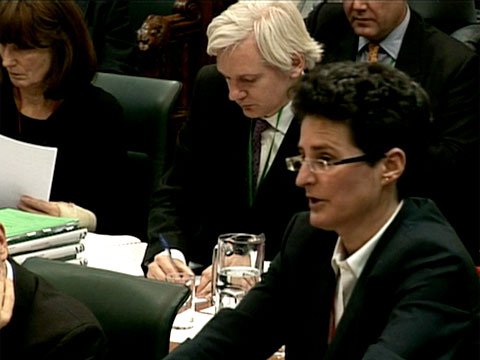
Ignoring criticism from legal experts in Sweden, Claire Montgomery QC, who had previously helped Chilean dictator Augusto Pinochet evade justice, and who later helped protect Prince Andrew from extradition to the USA, argued that the Swedish Judicial Authority was just following their normal procedures. The Guardian reported that this could be the last time Assange’s case was heard in a British court.
The supreme court judges retired to consider their judgment, which will be reserved for what is expected to be several weeks. If they decide to uphold the high court ruling, Assange could be sent to Sweden for questioning within days.
Another key issue for the judges to consider was Britain’s 2003 Extradition Act, which was introduced as part of the "war on terror" to facilitate the process of extraditing "persons of interest." Would Julian Assange be treated the same as a terrorist?
The Simpsons
In a totally unrelated twist, meanwhile, Geoffrey Robertson’s wife Kathy Lette had been approached by Julian Assange and the producers of The Simpsons cartoon show. They wanted her to rewrite the dialogue for a scene in their 500th episode, where Assange made a cameo appearance. The plot involved the Simpsons being driven out of Springfield by angry citizens and ending up living in a place called The Outlands, where the WikiLeaks founder was their new neighbour.
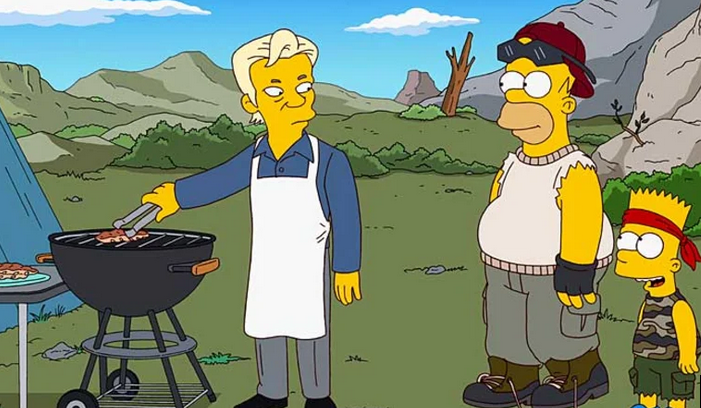
"I guess they just wanted me to add a little Aussie irony to the script," said Lette. "Julian does not suffer from any irony deficiency… My best joke is when I get Marge to ask Julian for his recipe at a barbecue and he replies 'I never reveal my sauces'."
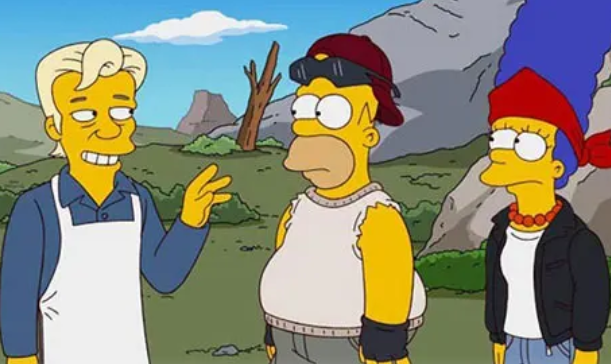
By this time WikiLeaks had already revealed that Julian Assange would soon be hosting a TV show of his own. They were seeking regional licencees for a series of ten half-hour episodes, set to launch in coming months.
“Through this series I will explore the possibilities for our future in conversations with those who are shaping it," wrote Assange. "Are we heading towards utopia, or dystopia and how we can set our paths? This is an exciting opportunity to discuss the vision of my guests in a new style of show that examines their philosophies and struggles in a deeper and clearer way than has been done before.”
The GI Files
In the final week of February 2012, WikiLeaks began publishing more than five million emails from the Texas-headquartered "global intelligence" company Stratfor. As previously mentioned in Chapter Nine, the most shocking revelation was an email from Fred Burton, Stratfor’s Vice-President for Counterterrorism and Corporate Security, who claimed that the US Grand Jury had prepared a sealed indictment for Assange at least a year earlier.
"Not for Pub — We have a sealed indictment on Assange. Pls protect."
A WikiLeaks statement showed how comments from the ex-CIA staff at Stratfor were closely aligned with US government tactics, and how Burton boasted of his ability to get hold of confidential US government information:
Emails from Fred Burton reveal that the US Government employs the same counterterrorism strategy against Julian Assange and WikiLeaks as against Al Qaeda: "Take down the money. Go after his infrastructure. The tools we are using to nail and de-construct Wiki are the same tools used to dismantle and track aQ [Al Qaeda]. Thank Cheney & 43 [former US President George W. Bush]. Big Brother owns his liberal terrorist arse."
Ten days after the CIA reportedly assassinated Osama bin Laden, Burton writes in an email sent to Stratfor’s "Secure" mailing list that he "can get access to the materials seized from the OBL [Osama bin Laden] safe house."
Burton states: "Ferreting out Julian Assange’s confederates is also key. Find out what other disgruntled rogues inside the tent or outside [sic]. Pile on. Move him from country to country to face various charges for the next 25 years. But, seize everything he and his family own, to include every person linked to Wiki."
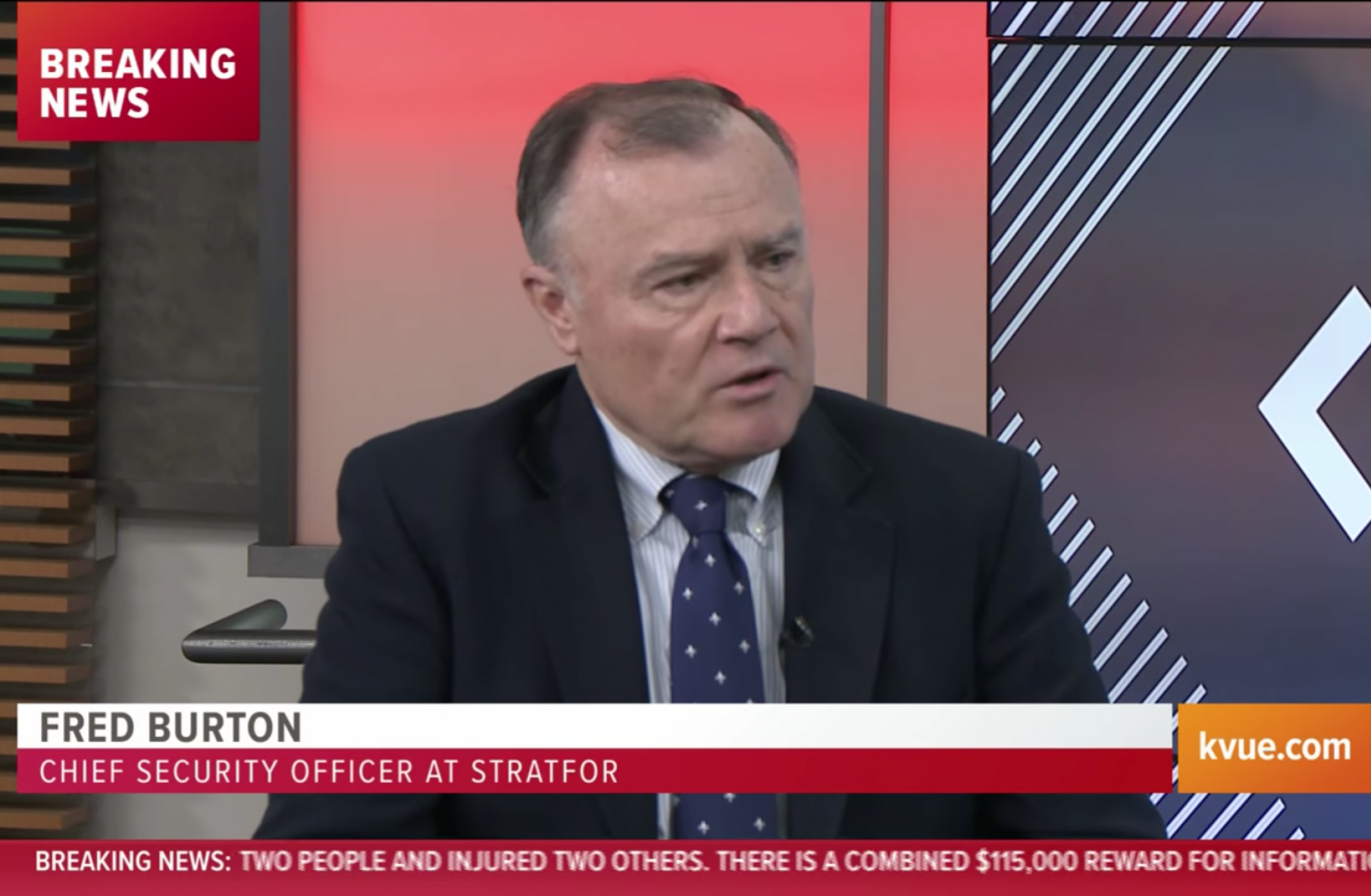
Burton, a former US State Department counterterrorism expert, suggested the US government would pursue "conspiracy and political terrorism charges" and then "declassify the death of a source" and blame it on WikiLeaks. His preferred strategy was to "bankrupt the arsehole first… ruin his life. Give him 7-12 yrs for conspiracy."
There were over 4,000 Stratfor emails that mentioned WikiLeaks or Assange, including multiple mentions of a sealed indictment going back to as early as June 2010, after the release of the Collateral Murder video but prior to the Afghan War Diaries release. The emails also showed how Stratfor monitored and analysed the online activities of Bhopal activists for the US chemical giant Dow Chemical. They also exposed the revolving door of staff moving between US private intelligence companies and the United States government.
Emails between the founder and Karl Rove, a senior advisor to George Bush, are among those released to date. The cache also contains gossip between Stratfor staff, apparently originating from the 2008 presidential campaign of John McCain, that the senator was encouraged to take action against President Obama for alleged electoral fraud in two states. Coca-Cola also seemingly engage Stratfor for background research against Peta activists in Canada ahead of the Vancouver Winter Olympics in 2010.

One of the largest #Anonymous accounts on Twitter, @AnonymousIRC, who had over a quarter of a million followers at the time, claimed to be the source of the hacked Stratfor emails. They later turned against Assange, presumably after their account was taken over by the FBI, and by December 2021 had only 663 followers.
The complete "global intelligence" files from Stratfor are still available on WikiLeaks.org as The GI Files.
The World Tomorrow
The first episode of Julian Assange’s "The World Tomorrow" TV show was broadcast on 17 April 2012. His first guest was Hassan Nasrallah, the leader of Lebanon’s Shia militant group Hezbollah, who had not spoken to the media for six years and had not done an English-language interview for over a decade. Even the Guardian’s Luke Harding conceded that Assange had "scored a genuine coup".
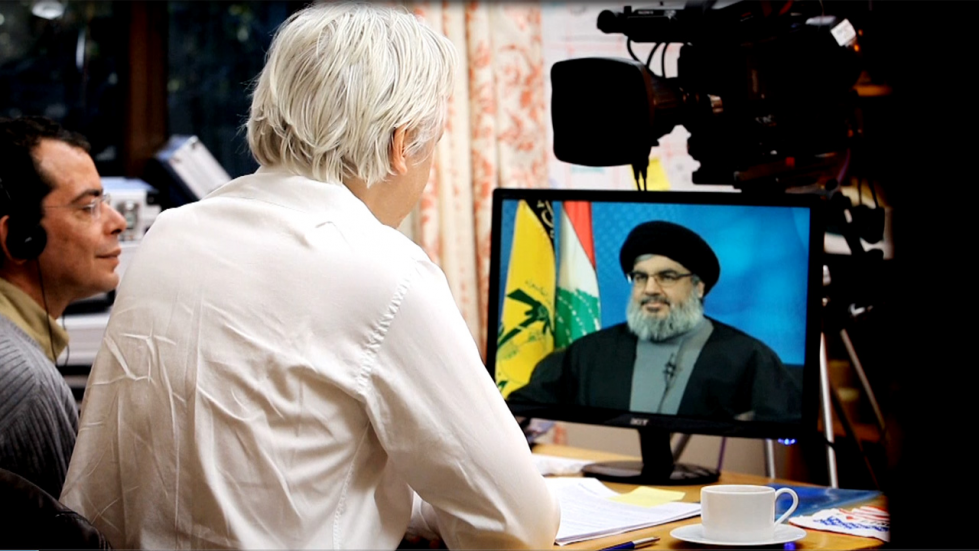
Communicating via satellite link, both host and guest participate in the conversation from secret locations: Julian Assange from his temporary home in the English countryside, where he has been detained for 500 days without charge; Hassan Nasrallah, from a Lebanese Hezbollah stronghold, where he goes about his work under continual fear of assassination at the hands of state and non-state actors.
The show was produced by Quick Roll Productions, a company established by Julian Assange with the help of Dartmouth Films, who also released films from John Pilger. British company Journeyman Pictures handled the distribution while British-Tamil rap star M.I.A. composed the theme song. Italian newspaper L’Espresso made the program available online in Italian. But Russia Today (RT) provided the bulk of the funding by purchasing the international broadcast rights in English, Arabic, Russian and Spanish. This of course lead to predictable criticism from Assange haters like Luke Harding:
The mystery is why Assange should agree to become a pawn in the Kremlin’s global information war. Perhaps he needs the money. Assange’s anti-American agenda, of course, fits neatly with the Kremlin’s own.
WikiLeaks was more than prepared for the smears, promoting a #SmearAndEnjoy hashtag with a satirical list of ready-made smears and a statement from Assange:
In this document, I try to lend a helping hand to the overworked hacks in the anti-Assange 'smearsphere' by indulging in a pre-emptive bout of self-hating WikiLeaks-bashing… Most of the time, I despair at the lack of imagination and poor sense of humour evinced by journalists and public figures who should know better. I have decided to hold out an olive-branch to our overworked detractors, by writing higher quality smears for them. Now please don’t take them all for yourself. One per “journalist”.
Assange also did a 20 minute interview with Russia Today, making it clear that he had full editorial control of his program. He said his team had chosen RT because they had higher penetration into the USA than Al Jazeera and their coverage of WikiLeaks had been more positive than "hostile" organisations like the BBC.
We believe that all media organisations have an angle… RT is a voice of Russia, so it looks at things from a Russian agenda, the BBC is a voice of the British government, the Voice of America is a voice of the American government. And it is the clashing of these voices together that reveals the truth about the world as a whole.
He also explained what motivated him to create the show:
As someone who has given a lot of interviews before, and been on the receiving end of very aggressive interview styles, I found that I wasn’t giving much away in interviews at all. Pretty quickly you learn to just give some pretty standard defensive responses so people don’t take what you’ve said out of context.
"The World Tomorrow" gave globally important figures an opportunity to speak on their own terms but Assange was far from a pushover as a host. Reviewing the first episode, Glenn Greewald said that Assange had conducted an "aggressive, adversarial interview… something most American TV personalities would be loathe to do".
But not only that, Assange’s questions were grounded in support for the Syrian opposition forces and were hostile to the Assad government: exactly the reverse of the Russian government’s position, which has maintained steadfast support for Assad.

The second episode of the show put “intellectual superstar” Slavoj Žižek up against "unrepentant Zionist" David Horowitz, a hardline US conservative. Intellectual figures Noam Chomsky and Tariq Ali appeared later in the season. One episode discussed the "Occupy" movement while two shows were dedicated to the "Cypherpunks" and the fight for Internet freedom.
Interviewee Imran Khan, who went on to become Prime Minister of Pakistan in 2018, said people like him "would never have had a chance of coming into power" before WikiLeaks cables exposed "two faced politicians". Another guest, Anwar Ibrahim, was set to become Prime Minister of Malaysia in 2020, despite repeated periods of imprisonment, before his coalition collapsed.
Assange also interviewed the new Tunisian President, Moncef Marzouki, who had been jailed by former dictator Zine El-Abidine Ben Ali and spent years living in exile. Episode four included jailed Arab Spring activists Nabeel Rajab from Bahrain and Alaa Abd El-Fattah from Egypt; both men would spend many more months in prison as the political gains of the Arab Spring were wound back. Episode five featured former Guantanamo Bay detainee Moazzam Begg, who was now Director of prisoner activist group Cageprisoners, and the group’s Executive Director Asim Qureshi.
Assange regretted that he was not able to interview jailed dissidents like China’s Ai Wei Wei, and said he had also tried to interview "the tops of power of some giant US corporations" via "indirect personal contact" but they said it was "politically just too dangerous".
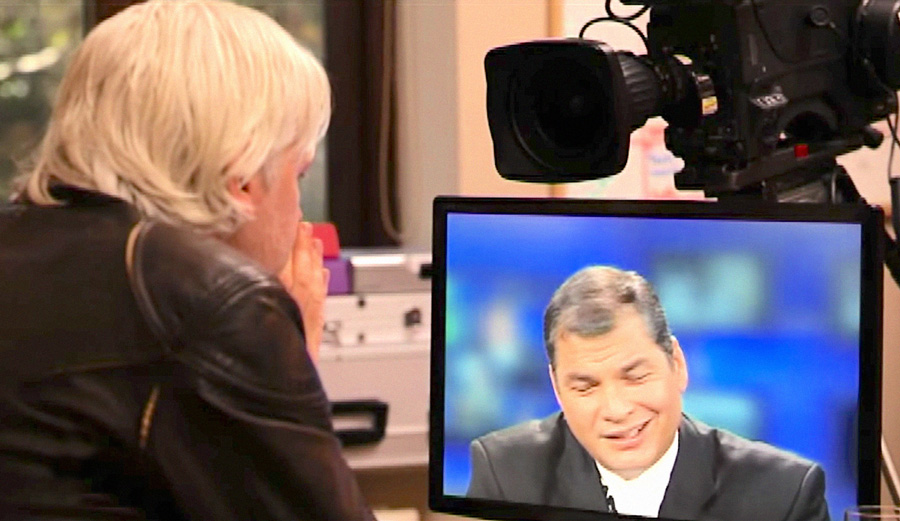
But given what was about to happen to Assange, his most important guest must have been Rafael Correa, the President of Ecuador. Episode six went to air on 22 May, just weeks before Assange sought political asylum in Ecuador’s London embassy. They discussed how Correa had stared down a violent 2010 coup attempt and how his attempts to limit corrupt media propaganda were being mis-characterized in the West as attacks on press freedom. Assange described how he had naively attended a Latin American media alliance - Sociedad Interamericana de Prensa (SIP) or Inter American Press Association (IAPA) - and was "horrified" by the blatant levels of corruption. Correa noted how corrupt media in Latin America had frequently misreported the US State Department cables from WikiLeaks, and said he was trying to promote free public media as a way to balance corrupt corporate journalism. He argued that in Latin America today "media power was and is probably much greater than political power" because those who controlled the media also controlled politicians and judges:
Let’s get out from our heads the poor brave journalists, angelical media trying to tell the truth and tyrants on the other side, dictators, autocrats, trying to avoid that. It’s not true. It’s the opposite. Governments who are trying to do something for the great majority of people, we are persecuted by journalists who believe that [they can] just insult people and engage in calumny. Please, the whole world should understand what is going on in Latin America. When I got to the government, there were seven national television channels, there was no public service television - all of them private. Five of them belonged to bankers.
Assange noted that WikiLeaks had experienced similar problems with media partners trying to misrepresent the cables, even in defiance of legal agreements. He reminded Correa that WikiLeaks had originally partnered with two Ecuadorian media companies - El Universo and El Comercio - but then the Ecuadorian government said 'Please WikiLeaks, we want you to release all the cables about Ecuador, all of them'.
Why did you want us to release all the cables?
Because we have nothing to fear, we have nothing to hide.
Correa said WikiLeaks had actually strengthened his government. In the wake of the Cablegate publications, he expelled the US Ambassador, saying her arrogance was an insult to his nation. He said one of the driving forces behind the 2010 coup attempt was that his reforms included cutting off funding from the US embassy to Ecuadorean police.
As Evo Morales says, the only country that can be certain it’s never going to have a coup d’état is the United States - because it doesn’t have a US embassy!
Correa also joked about Ecuador shutting down the US military base in Manta, saying it would not have been a problem if US officials had just let Ecuador build a military base in the United States. Assange struggled to stop laughing while conducting the interview. The two men were off to a good start.
*
Australia Abandons Assange
Australian lawyer Jennifer Robinson had long been calling for the Australian government to assist her Australian client Julian Assange, with little to show for her efforts. In a 40 minute meeting with Attorney General Nicola Roxon on 2 May 2012, according to an email later obtained under FOI laws, Robinson "outlined a list of issues on which she hoped the Australian Government would seek advice or assurances from the UK, US and Sweden".
Roxon said "she could not at this time commit to a particular course of action in respect of the list Robinson had provided" and "Australia had no legal grounds to act preemptively though there may be some things we can do diplomatically".
Assange later noted that the Attorney General was flanked by two other people in that meeting:
On her left her national security political adviser, on her right the departmental national security adviser. And the Attorney-General is responsible for the Australian intelligence services. Why are these two guys there? What have they got to do with the Swedish sex allegation? Why are they there?
Opposition spokeswoman Julie Bishop said Australians were entitled to wonder why Assange was not being treated the same as other Australians facing problems overseas who recieved high level consular and diplomatic support. But when Bishop became Foreign Minister a year later, she continued promising meaningless secret "diplomatic efforts" for another five years.
Roxon sent a formal letter to Robinson stating that Australia would not seek to involve itself in any international exchanges about his future.
"Australia would not expect to be a party to any extradition discussions that may take place between the United States and the United Kingdom or the United States and Sweden, as extradition is a matter of bilateral law enforcement cooperation."
Julian Assange said this letter could only be described as "a declaration of abandonment".
"This is not even the usual mealy-mouthed weasel words that bureaucracies use."
Australian Foreign Minister Bob Carr was also busy wiping his hands of Assange with acrobatic oratory tricks. He said consular officials were in contact with Assange’s lawyers and the Australian government had made representations to ensure he would be treated fairly in Sweden.
"As far as I can tell there’s been no Australian who’s received more consular support in a comparable period than Mr Assange," said Carr.
In his memoirs, published years later, Bob Carr admitted that he had no idea if this claim was even true:
"Strictly speaking, I don’t know whether this is the case. But it is a broad, healthy truth that I don’t think anyone could disprove. I do it to needle his self-righteousness. Let him go to Sweden and face questioning for sexual assault and rape… Sure enough, my needling has an effect.”
He also admitted that he was "fed up with complaints from [Assange’s] family suggesting he hasn’t been supported by Australia and the opposition spokesperson saying the same thing".
By this stage Julian’s exhausted mother Christine - who posted a detailed open letter to the Australian people weeks earlier - was way beyond disgusted:
"They’re absolutely useless, all they do is book themselves seats to watch what’s going on. US politicians are still calling for Julian to be killed and they wouldn’t even ask the American Government to tone it down."
Assange later said he had had no personal contact from anyone at the Australian High Commission in London since December 2010:
The last time U.S. consular officials met with my lawyers was back in the past December and they didn’t provide anything at all. We were just handing over these demands to them. They have provided us with no legal advice ever. Whatsoever. The last time that I met with any persons from the Australian Embassy, any person claiming to be related to consular support, was when I was in prison in 2010. December 2010, locked in solitary confinement and they gave me a notepad.
So when Bob Carr says "consular support," what he means is the Foreign Minister’s office coming to court and observing what’s going on so that he can write a brief to the minister in order to best prepare the minister’s press lines. None of that information comes back to us. And when we’ve tried to get hold of it, for example through the Freedom of Information Act or when the Sydney Morning Herald has tried to get hold of it, 95% of it is entirely blacked out, with FOIs being withheld in some cases for 18 months. Even though legally they should only be held for 40 days…
Look, I don’t even have the rights of the defendant, because I haven’t been charged. I don’t have a right to see any evidence against me, see the detailed allegations against me, to counter these matters in a legal way, because I am not even a defendant. We have a basic notion in Australia that you are free to go about your life as an adult until the Government charges you with an offence. And then you must have your day in court, and it’s the Government’s responsibility to show, beyond a reasonable doubt, that you have done something wrong. But until at least being charged, let alone convicted, you are free to go about your life as a free citizen. For the last 540 days, I have been detained without charge.
Senator Scott Ludlam’s efforts to seek Australian government support had also hit a brick wall:
Senator BOB CARR: We have seen no evidence that such a sealed indictment exists.
Senator LUDLAM: Have you sought such evidence?
Senator BOB CARR: We have not sought evidence, but we have seen no evidence that it exists.
Senator LUDLAM: Well, of course you haven’t.
When Julian Assange entered the Ecuadorian embassy, Bob Carr was in Libya personally pleading for the release of an imprisoned Australian lawyer, Melinda Taylor. She was set free just two weeks later.
- NOTE
-
Taylor later became a strong supporter of Assange and worked on his case with the UN Working Group on Arbitrary Detention in 2016.
*
UK Supreme Court Gets It Wrong
On 30 May 2012 Britain’s Supreme Court ruled by five to two that Julian Assange’s extradition appeal had failed. To avoid leaks, lawyers were not shown the judgments until 8.30 that morning. This was odd; draft judgments are normally circulated to counsel up to a week before delivery so that they can point out any minor errors such as mis-spelled names or incorrect dates.
Assange was not present in the Westminster courtroom (there was no legal requirement for him to be there) - his solicitor, Gareth Peirce, explained that he was stuck in traffic. A scene from the video documentary RISK shows him in a car with Sarah Harrison, on the phone to others, asking what was happening.
What was happening was quite unusual.
Lord Phillips explained that his fellow judges believed Swedish prosecutor Marrianne Ny qualified as a "judicial authority" and therefore her European Arrest Warrant was valid.
But then Assange’s representative, Dinah Rose QC, addressed the court. She said nobody had even asked her about the key issue on which three of the five ruling judges claimed to have based their decision. This was all about Article 31.3 of the 1969 Vienna Convention on the Law of Treaties, which states that treaties can be interpreted bearing in mind the "subsequent practice" of their application.
One judge said this opportunity to "interpret" the meaning of European law was a "determinative" point. Another said he based his conclusion "principally" on this point. A third said it was "ultimately critical". And yet this critical point had not even been discussed in court.
As Joshua Rozenberg explained, this was "very embarrassing for the Supreme Court":
The judges gave Rose two weeks to make written submissions on this point. "If she decides to do so", they said later, they would "then decide whether to re-open the appeal and accept further submissions (either verbally through a further hearing, or on paper) on the matter."
In the end, the judges may decide that they were entitled to take the Vienna convention into account. In that event, they would presumably confirm the decision they delivered today. But given two weeks to prepare her case, Rose could well come up with other arguments. In the meantime, Assange can stay in the UK.
It was the first time the UK Supreme Court had been forced to re-open a case since the 1998 Pinochet extradition drama, in which prosecutor Clare Montgomery QC was also involved.
As John Pilger observed:
"This case moves in mysterious ways and we are about to move into another mysterious stage of this whole unnecessary process."
In fact, things were even more mysterious than Assange’s legal team knew. In 2021 Stefania Maurizi provided proof that Swedish and UK authorities had been secretly plotting ways to extradite Julian Assange after the "expected" Supreme Court ruling and before he could file an appeal with the European Court of Human Rights.
The FOIA document reveals that on the 8th of December 2011, the Swedish member of Eurojust – the European Union’s agency for criminal justice cooperation – contacted his British counterpart expressing optimism that the British Supreme Court in London would deliver a verdict in Sweden’s favor. “It is my experience in similar situations from Eurojust it is important with a pick as close to the decision as possible to avoid conflicts with an expected appeal to the European Court of Human Rights. After the 10 days time frame there is no longer a possibility to have coercive measures against Mr A”.
In other words, according to what the then Swedish member of Eurojust wrote in his emails to the British member, Sweden aimed to extradite Julian Assange before he could appeal to the European Court for protective measures.
In normal circumstances, if the Supreme Court had not stuffed things up, Assange would have had only 14 days to surrended to UK authorities. Instead his lawyers filed a new 18-page submission nearly two weeks later, on 12 June 2012. The application included a request for the Supreme Court to correct their false statement that Assange "stands charged" in Sweden.
"It is notable that, following the hearing, the Court on three occasions wrote to the parties seeking further written submissions on points which the Court was considering including in its judgment, but which had not been argued before it, including elements of the Parliamentary process, and the applicability of Pupino. The applicability and effect of Article 31(3)(b) of the VCLT was not raised even at that stage. It is of particular note that the issues upon which the parties were afforded the opportunity to make subsequent written submissions were ultimately determined against the Respondent. The Respondent thus was afforded an opportunity to make submissions upon new issues which were adverse to the Respondent’s interest. By contrast, the Appellant was afforded no opportunity to make submissions upon the single issue, arising post-hearing, that was to be decided adversely to him, and determinatively so.
A Guardian article noted that if the UK Supreme Court upheld their ruling, Assange could still take his case to the European Court of Human Rights (ECHR), "further delaying the extradition process for many months".
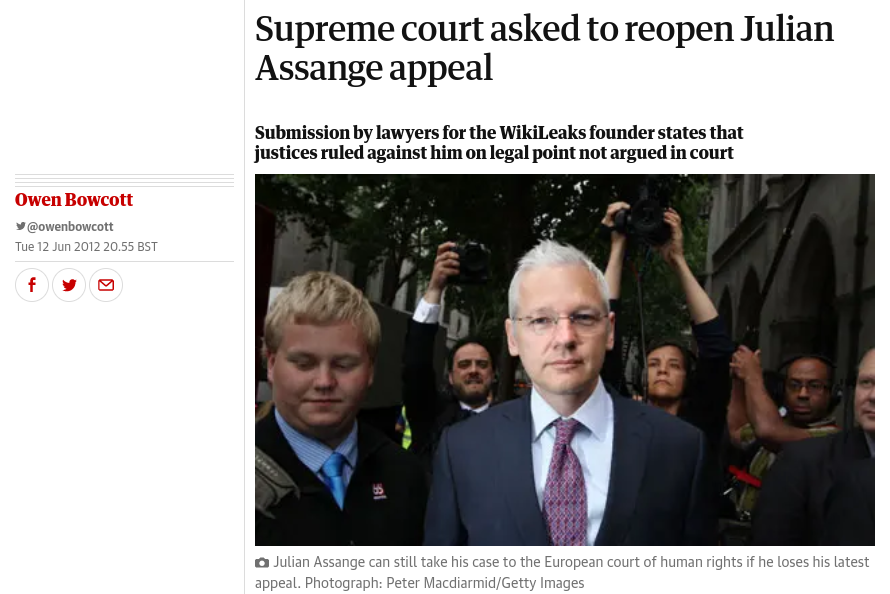
But by now Assange had totally lost faith in UK authorities. Weeks later he told Australia’s ABC News:
"They tried to cancel the 14 days that I had here to apply to appeal the matter at the European Court of Human Rights".
It took the Supreme Court only two days to turn down Assange’s last minute appeal. The Australian’s final appeal to British justice had failed. Assange supporters claimed that British justice had, in fact, failed. The award-winning journalist, editor and publisher had only fourteen days to surrended to UK authorities.
At 11 pm that night, UK government security contractors arrived at Assange’s residence demanding to fit a new tagging device on his ankle, claiming the battery signal was low. The message was clear: we are watching you.
*
Run, Julian, Run
On 4 June 2012 Julian Assange vented his frustration in an Australia radio interview:
For over 540 days, I’ve had an electronic manacle around my leg, being under house arrest, being forced to be in this country because of one reason: the Swedish Government will not come to this country and interview me. They will not interview me on the phone. It is perfectly within their legal entitlements – there are standing treaties to do this, called the Mutual Legal Assistance Treaty — and it is done, in other cases in Sweden. So the case has not progressed because I am suspicious of what is happening in Sweden and the Swedes will not provide us sure answers. The obvious thing to do — the Swedish Government was criticized in the high court — is simply to pick up the telephone and call me. Or if they want to do it in person, to meet me. Or if they want to do it on Swedish soil it can be at the Embassy. Or they can use standard treaty techniques like the Mutual Legal Assistance Treaty. It makes you wonder what the hell is going on? And is this how a government operates, is operating, in good faith?
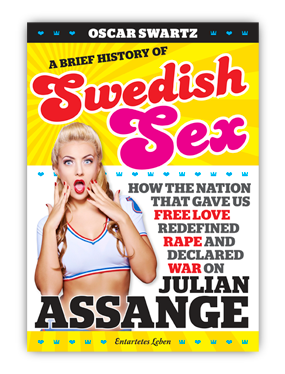
On 17 June 2012 WikiLeaks Central posted a review of a new book, "A Brief History of Swedish Sex":
Structured as a timeline, the volume vividly illustrates how a political coup by a group of radical feminists at the highest levels of government caused the free-love era of "Swedish sin" to give way to a wave of anti-sex and anti-male hysteria that vilified heterosexual sex and villainized men. It was into this morass that WikiLeaks leader Julian Assange waded when he had consensual sexual relations with Anna Ardin and Sofia Wilén — and then became the target of a Sweden-initiated international manhunt.
On 19 June Christine Assange posted a long list of tweets about the extradition process:
-
Australian PM Julia Gillard and Opposition leader Tony Abbot backed new Extradition Act Amendments making it easier for U.S.A to extradite Aussies. The Greens fought it.
-
For the FIRST TIME Aussies can be now be extradited for minor offences.
-
The protection of "political" motives has been weakened. If the charge is "terrorism" then "political" cannot apply to prevent extradition.
-
The U.S.A. recently expanded its definition of "terrorist" to include peaceful protesters - "Low level terrorism".
-
Under the new NDAA legislation, the U.S became a police state - citizens and foreigners can be arrested without warrant and indefinite detention applies.
-
In 1971 the U.S. Supreme Court ruled it legal to publish classified documents. Obama is now trying to label media who do so as terrorists.
-
Modifications to the act included changing "protection from death penalty" to "likelihood the death penalty would be carried out".
-
Note that the U.S.A is in the top 5 countries for killing its own citizens, and the only Western country in that top 5.
-
Even Minor Offences under the new Extradition Amendments are punished with up to 12 months imprisonment.
-
The UK/US Bilateral Treaty allows the U.S.A to extradite from the UK without any prima facie case (i.e. evidence).
-
The Swedish/US Bilateral Treaty gets around safeguards of normal extradition with a fast-track "Temporary Surrender" clause.
-
The US Grand Jury convenes in secret. There are 4 prosecutors, no defence, and no judge. It can issue indictments for Extradition with no proper legal process.
-
Sweden has not refused an Extradition request from the USA for over 20 years.
-
In 2001 Sweden gave two innocent Egyptian refugees to the CIA for rendition to Egypt, where they were tortured.
-
The Swedish Justice Minister who signed off on the CIA rendition torture flight was Thomas Bodström.
-
Thomas Bodström is now the business partner of Claes Borgström, the politician/lawyer of the two Swedish women in the Assange case.
-
The Australian Greens supported a motion by Senator Scott Ludlam to protect Julian from "Temporary Surrender" to the U.S.A via Sweden. Both Labor and the Coalition opposed it.
On the same day, as later shown in the movie RISK, Julian Assange dyed his hair red, put on fake contact lenses and an ear-ring…
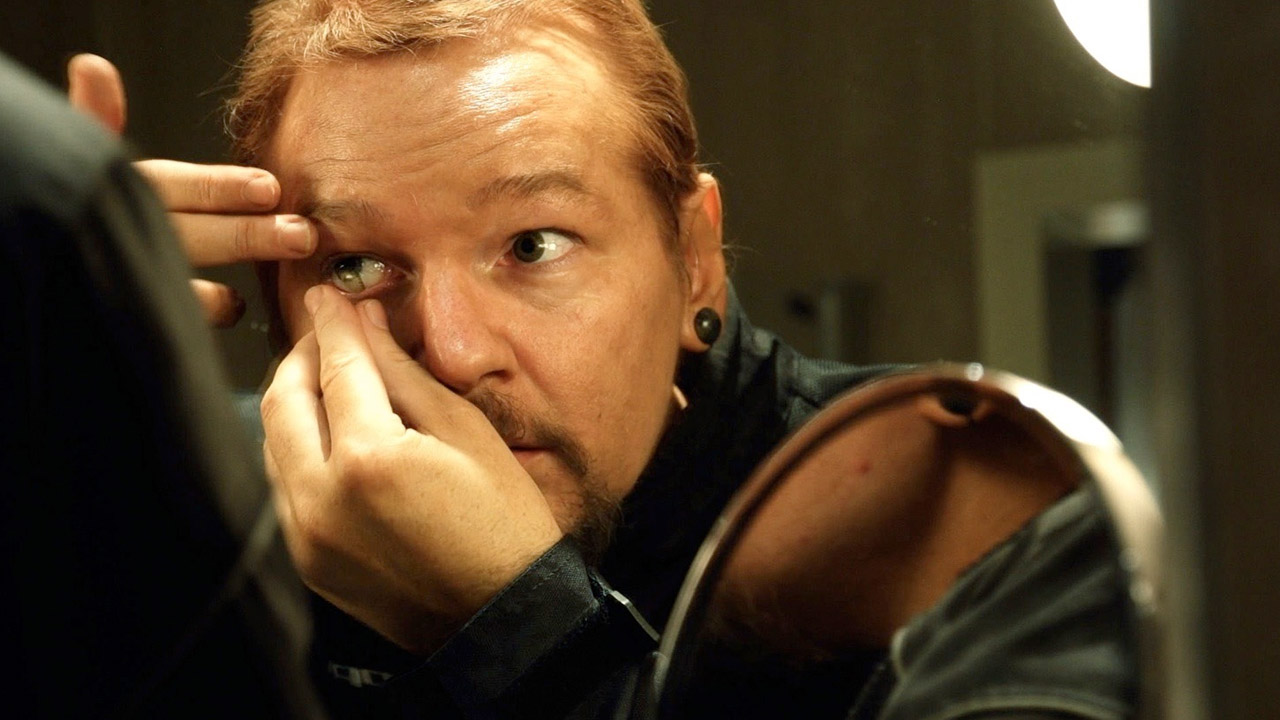
disguised himself as a motorbike courier, said goodbye to his mother…
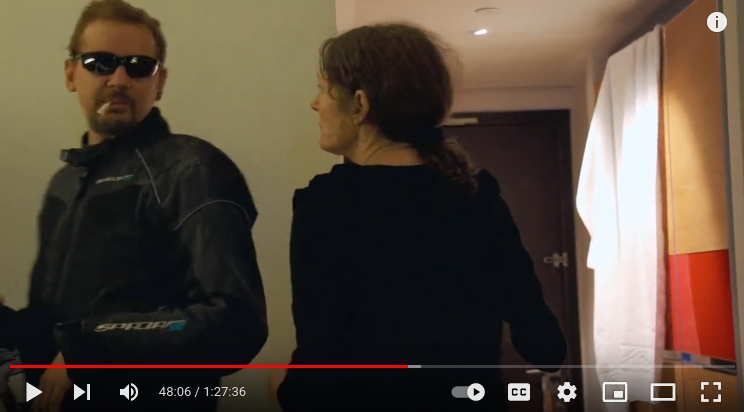
and drove into central London…
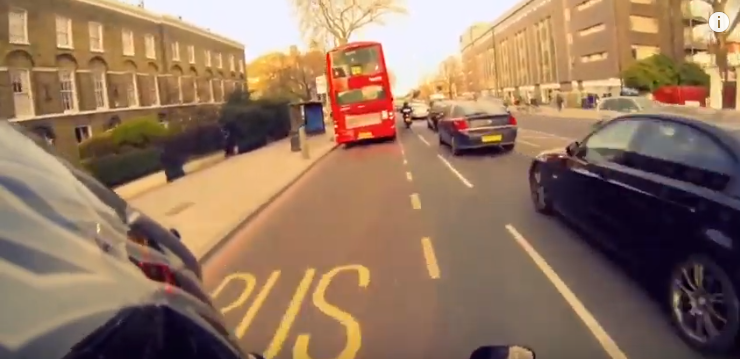
He then entered the offices of the embassy of Ecuador at 3 Hans Crescent, just behind the famous Harrods department store, and declared that he was seeking political asylum.
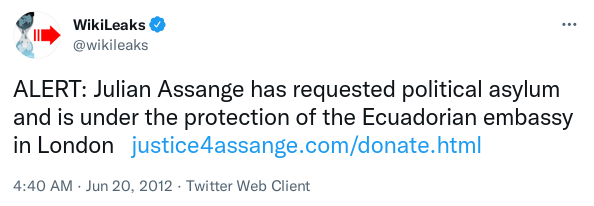
*
The author of this book can be found on Twitter: @Jaraparilla
Thank you.
*
Home - Genesis - 2007 - 2008 - 2009 - Early 2010 - Mid 2010 - Late 2010 - End 2010 - Early 2011 - Mid 2011 - Late 2011 - End 2011 - Early 2012 - Late 2012 - Early 2013- Late 2013 - 2014 - 2015 - Early 2016 - Late 2016 - 2017-19
Copyright Gary Lord 2021, 2022, 2023